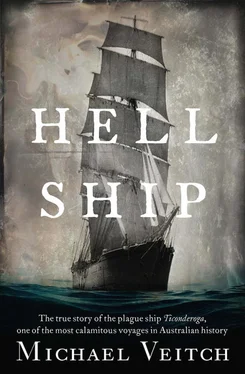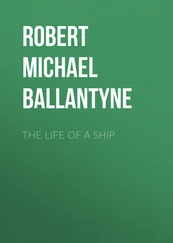The family lines established by the surviving passengers of the Ticonderoga spread into all aspects of Australian life, with many thousands claiming their place as descendants to this day. The last known Ticonderoga survivor, Mrs Isabel Hennessey of Mortlake in Victoria, lived until 1944, having arrived 92 years earlier, with her family as an infant. [1] Welch, 1969, p. 36
Christopher McRae, who had walked the 60 miles from the camp to his relatives in Coburg, lived to the age of 96, a resident of the Victorian agricultural town of Maffra. His mother’s grave and those of his siblings were relocated to the quarantine station’s new cemetery in 1952 with a new headstone that reads:
Sacred to the memory of Helen McRae the beloved wife of Malcolm McRae who departed this life January 3 1853 aged 41 years Her daughter Janet died November 1852 aged 11 years. Her son Malcolm died 6 November 1852 aged 2 years Her son Farquhar died 22 November 1852 aged 6 years Her son John died 22 January 1858 aged 16 years.
Charles McKay, the sexton and schoolmaster, survived; however, the effects of the voyage on his health were such that he declined to take up his position as headmaster of the prestigious Scotch College. Instead, he settled himself in Kilmore, about 40 kilometres north of Melbourne, running a tiny school for the local children, many of whom were of Highland descent. It was an area, say his family, that reminded him of his home in Sutherland. McKay died just fifteen years later, at the comparatively young age of 61.
Captain Thomas Boyle was praised effusively for his steadfast and humane command during the crisis, particularly by Lieutenant-Governor La Trobe who, ‘in appreciation of his conduct throughout the voyage and its termination’, [2] Kruithof, 2002, p. 107
granted him a double gratuity of nearly £130 instead of the agreed £64. There were, however, a number of caveats and hidden clauses, which in the end caused Boyle to lose money on the saga.
After the last of his passengers had left the ship, he found he was still carrying the large amount of luggage from the deceased that had been so poignantly observed by the passengers as it was loaded back at Point Nepean. Now Boyle found he would be charged £60 for it to be transferred up to the Immigration Barracks. With the custom being to regard a ship’s passengers as under the care of their captain until reaching port, Boyle was also forwarded the bill for the extra food supplied to them while in quarantine at Point Nepean, as it was regarded that, while they remained there, the contracted journey had not been completed. To add to the insult, he then discovered that, for this same reason, the second half of the payment per head of the passengers who had died, and which he had expected to be paid by the Colonial Land and Emigration Commission, would not be forthcoming. To perhaps soften the blow somewhat, Grimes agreed to sell off their belongings and give the proceeds to Boyle as compensation, but it is not known whether this ever transpired.
As a final blow, Boyle found that the small amount of cargo he had brought over from Britain with the intention to sell it would have to stay in the holds, as the Hobson’s Bay stevedores refused to touch it, nor have anything whatever to do with the plague ship. Bitter and broke, Boyle set sail in his empty ship from Port Phillip on 15 January 1853. On his way out of the Heads, he passed for the final time the quarantine station on the little beach. He could see that the tents he had sold on the spot to Harbour Master Ferguson were still up, but the beach otherwise looked deserted. Somewhere behind them, on a patch of buffalo grass in the sun, lay the grave of his younger brother and third mate, William, who had, like nearly 170 others, fallen to illness on board the ship. He thought of the little memorial he had arranged to be placed there in his memory, and was pleased he was resting in such a pretty spot, but knew that he was unlikely ever to visit it again.
Passing out through the Heads, the Ticonderoga set course for Akyab in Burma, her next port of call, where Boyle felt he could pick up a decent cargo. Having left Australia, never to return, from this point on, Thomas Boyle’s story is a mystery. Beyond his leaving Port Phillip for Akyab, no further record of his life and career can be found.
The Ticonderoga , however, sailed on. In July 1863, she was recorded as having been ‘sold to foreigners’, and the following year was registered in Calcutta, [3] Carroll, 1970, p. 24
from where she continued to ply the routes of the Empire’s ‘far east’, being sold twice more, until eventually being wrecked off the southern coast of India in October, 1879. Even then, in the waning years of the Clipper age, she drew attention as one of the most beautiful ships to sail the seas.
Back in England, the relatives of those who had perished on the ship waited in vain for news of their safe arrival. Yet, despite several entreaties from increasingly worried families, the Board remained silent. Eventually, an unsigned letter appeared in the London Times , in April 1853:
Sir,
I beg to call your attention to the case of the Ticonderoga , the unfortunate emigrant vessel that sailed from Birkenhead last year with from 800 to 900 Government emigrants to Australia, and of whom no fewer than about 180 died on the passage and in quarantine. Nearly three months have now elapsed since advice was received in this country of the arrival of the vessel, and of the state of the passengers, and of course great anxiety must have been felt to learn the particulars; but your readers will scarcely credit the statement, that till the arrival of the Great Britain , a few days ago, no official advices had been received by the Board of Emigrant Commissioners of the arrival of the vessel, and that up to this hour no list of the passengers who died has yet been received. Thus, though about a fourth part of the number of passengers have been cut off by death, the thousands of anxious relatives are still kept in suspense as to the fate of their friends. I am at all times desirous to exercise leniency in judging of the operations of Government establishments and officials, but I can scarcely conceive a more harrowing case of painful solicitude than must be felt by the sorrowing relatives of this large body of emigrants; neither can we suppose other than great remissness of duty somewhere in connexion with this lamentable case. I may add that the agents of the vessel having had no charge of the shipment of the passengers, and the owners being resident in America, there is no other source open for the desired information than the Board of Emigrant Commissioners. [1] Welch, 1969, p. 28
Their sole consolation was that after the Ticonderoga , no more vessels of such large burden would be hired by the Board to transport assisted passengers.
A Commission of Inquiry was undertaken in the new year, which resulted in a large amount of opinions and paper being sent around the offices of the Victorian Colonial government, and back and forth to London; yet, no one from the actual ship seems to have been consulted.
One alarming revelation from the inquiry was the practice of ship owners to quietly circumvent the government’s withholding—in the case of death—of the second half of the passenger payment by taking out insurance on their human cargo. This way, whether delivered alive at their destination or not, the owners would still receive their money in full. An appalled parliament quickly outlawed the practice.
Health Officer Dr Hunt’s lengthy report, delivered well into the next year, left nothing to the imagination in its lurid descriptions of the state of the vessel:
Читать дальше












